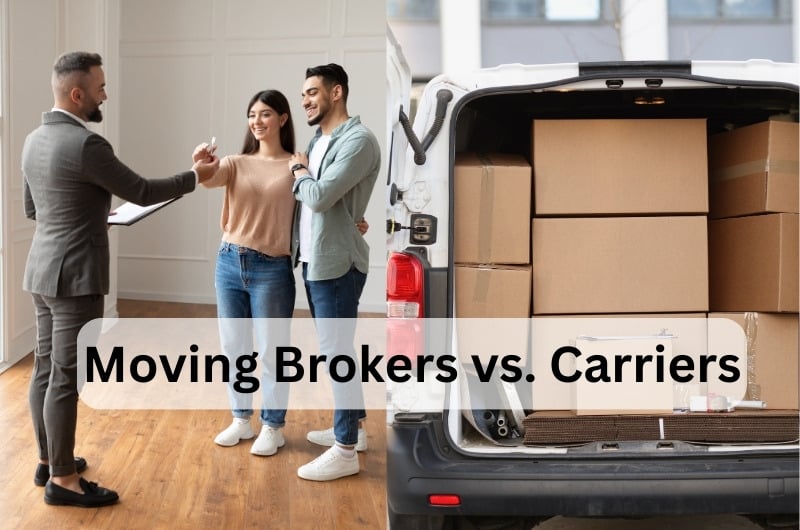
Prefer not to leave your phone number?
No problem!
Schedule an Appointment at your Convenience
(Only email is required)
Schedule an AppointmentOr Call Now
844-545-1881By: Last Updated: Oct 19, 2023
When it comes to moving, the decision between working with a moving broker or a moving carrier holds significant implications for your relocation experience.

When relocating, there are two main types of companies one can choose from. These include moving carriers and brokers.
Knowing the difference is important because it affects what services you get and how your moving experience goes.
In this article, we’ll look at moving brokers and carriers and help you decide which one is best for your upcoming move.
A moving broker is a company that acts as an intermediary between you and cross country movers. To operate, a broker must be registered with FMCSA (Federal Motor Carrier Safety Administration).
For long-distance moves spanning states, they must use long distance movers registered with FMCSA. Usually, moving brokers don’t have their own trucks or movers and are not authorized to offer transportation services. Instead, they hire carriers to move your belongings.
After contacting a moving broker, they’ll inquire about your move details, such as the destination and the volume of belongings. After that, they’ll reach out to their network of vetted partners and give you a list of moving companies that match your needs, along with their quotes.
A moving broker does all the legwork for you and finds the moving companies that best match your needs and budget.
A moving carrier operates its own fleet of trucks and employs its staff of movers. They must be registered with FMCSA, have a USDOT number, and have a proper insurance level to operate.
They carry out loading, transportation, and additional services for your move. Moving carriers offer comprehensive insurance coverage for your belongings throughout the transportation process.
Let’s delve into a detailed comparison between moving brokers and moving carriers so you can better evaluate which option aligns with your interstate moving needs and preferences.
A moving broker is a middleman who connects you with a moving carrier. They do not own trucks or hire movers themselves.
A moving carrier is a company that owns trucks, hires movers to transport your belongings, and manages the moving logistics.
A moving broker is not responsible for the safety or security of your belongings. They are only responsible for matching you with a moving carrier.
A moving carrier assumes complete responsibility for the safe transportation of your belongings from the time they pick up your belongings to the time they deliver them.
Moving brokers usually charge a fee for their services. It can be a percentage of the total moving cost or a flat rate. Moving carriers charge by the hour or by the weight of your belongings.
Hiring a moving broker can simplify the process as they handle all the logistics, including paperwork and coordination.
Engaging a moving carrier is ideal when you need tailored moving solutions, as you can directly work with them to customize your move.
Check their U.S. Department of Transportation (USDOT) number, read customer reviews, and assess their ratings on platforms like the Better Business Bureau.
Moving brokers are required to disclose that they are not moving carriers in their advertising. The moving broker must also advertise their U.S. Department of Transportation number. Make sure to read all the advertised material carefully.
Reputable brokers usually have a network of pre-vetted moving companies. They choose partners based on their reliability, services, and track record.
Moving carriers often offer insurance options to protect your belongings during the move. Make sure to ask about their moving insurance policies.
Direct communication with a carrier gives you more control over the moving process, enables you to make specific requests and get immediate answers to your questions.